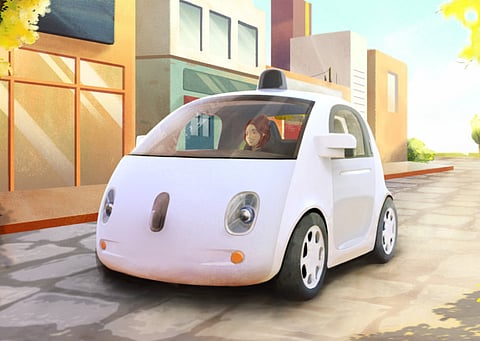Self-driving cars: A solution for Saudi women?
Gulf citizens doubt that the Google car will end women’s dependence on a male driver

Manama: Will women in Saudi Arabia be able to take advantage of Google’s new self-driving cars to move around?
The questions has popped up in the minds of those who believe that women who cannot legally have a driving licence can soon use the cars without breaking traffic rules or social taboos, since they will be riding and not driving.
Google this week announced the launch of the car, stressing that the overarching goal with the self-driving car programme has been to develop vehicles that are safer than the ones driven by humans.
Around 1.2 million people die from auto accidents each year and Google believes it can bring the dramatic figure down by 90 per cent using a technology that can sense and react to things faster than human beings can.
However, for some Saudis and other Gulf nationals, the new car could present a golden opportunity for women to “drive”, unless a fatwa (religious ruling) bans it.
“I have heard so many fatwas to explain why women should not be allowed to drive that I will not be surprised by a new ruling related to the Google car,” Noof, a young Gulf woman, said.
“I am almost sure a religious figure will soon appear on a television screen, claiming that women should not be allowed to ride in such cars because it amounts to driving, and that is something beyond any discussion,” the office clerk said.
Ines Darweesh said that he did not believe the driverless car would make any difference in the Saudi mindset against female driving.
“The issue is not really about women driving,” she said. “It is about a social status that they are not ready to change. Some people believe that allowing women to move freely and easily will have a great impact on society and will change the kingdom’s way of life. So self-driving cars remain vehicles that allow women to move too freely for the society to tolerate,” she said.
A Saudi scholar recently argued that allowing women to drive meant changing the whole social structure.
“If we allow women to drive, then we will have to drop the concept that women need a mahram (an adult male relative) with them as they travel,” Habeeb Al Mutairi said.
“And if a woman is allowed to travel freely, then she will need a hotel to stay in. In such a case, we have to abolish the decision that women cannot stay alone in hotels. This, in turn, means that we should allow women to take up positions in hotels and accommodation facilities in order to serve [other] women.
"We will also need to set up special women’s section in all traffic police stations and in all workshops to help women drivers who have flat tyres or mechanical problems with their cars,” he said.
Sign up for the Daily Briefing
Get the latest news and updates straight to your inbox



